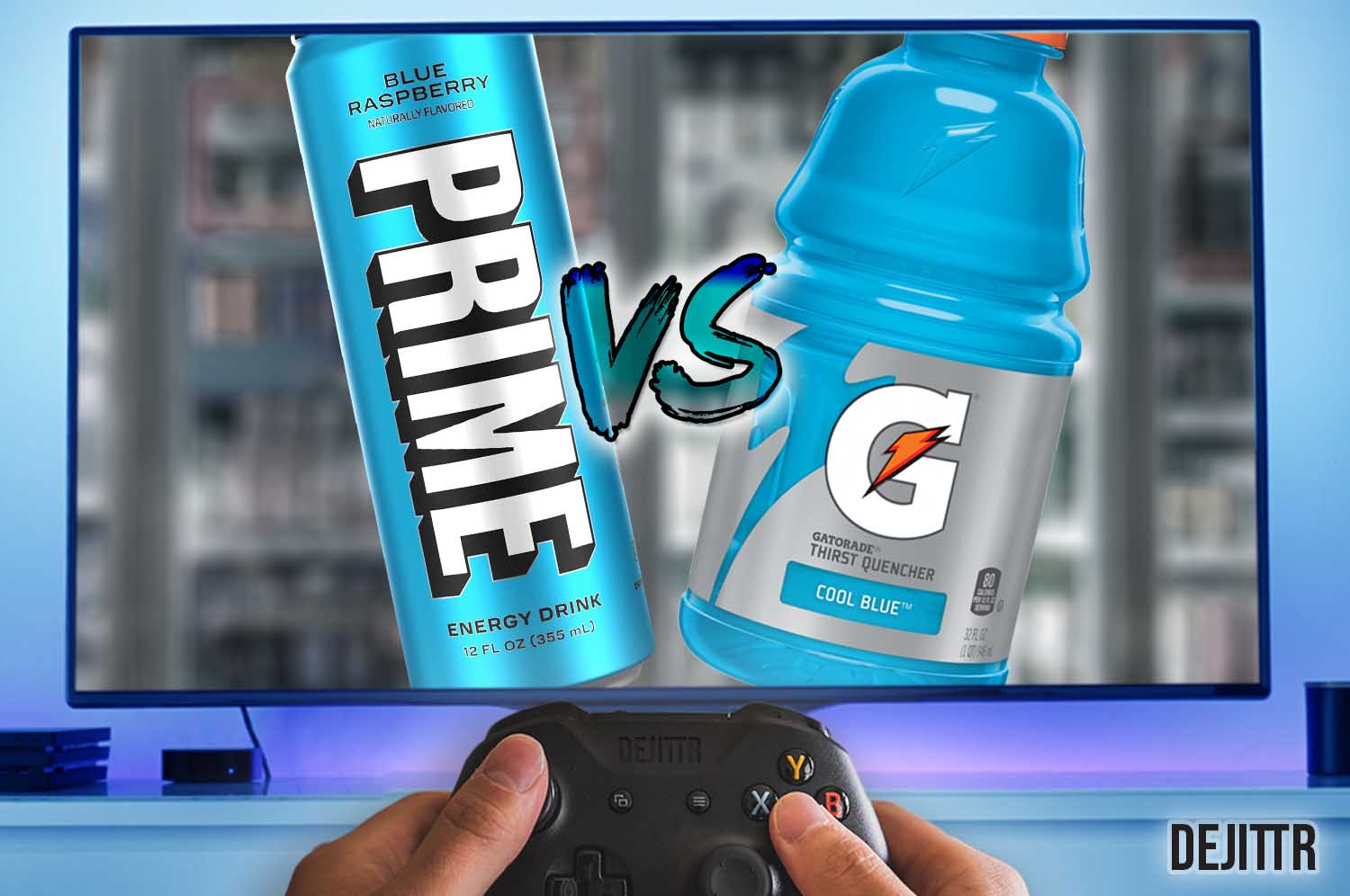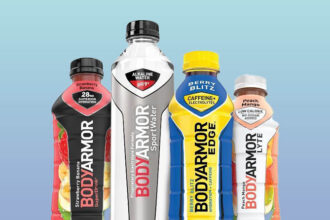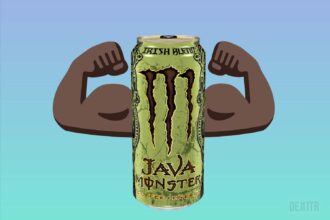This article is not a direct apples-to-apples comparison, but I feel it’s important to help people distinguish between the 2 types of beverages. Although there’s no rock-solid rule as to when you should drink a sports or energy drink, I still will dive into the best use case for them to maximize your performance.
Key Takeaways:
Prime Energy is a low-calorie, zero-sugar energy drink designed more for alertness, whereas Gatorade is a high-calorie, electrolyte-rich sports drink specifically meant to rehydrate after or before physical activity.
Read on to learn more about both Prime Energy and Gatorade.
| Comparison | Prime Energy | Gatorade |
| Founded | 2023 | 1965 |
| Founders | Logan Paul and KSI | James Free, Dana Shires and Alex de Quesada |
| Calories | 10 | 140 |
| Sugar | 0 g | 34 g |
| Caffeine | 200 mg | 0 mg |
| Electrolytes | 300 mg | 350 mg |
Recommended Resource:
A few of our readers wanted to know the intended purpose of Gatorade’s G1, G2, and G3. So we put together a detailed resource on how each drink improves your performance.
Electrolyte Stack explored
One thing that slightly puts these two beverages in the same realm is their electrolytes. Electrolytes are good for recovery.
Examples of electrolytes include:
- calcium
- magnesium
- chloride
- phosphate
- potassium
- sodium
What are the Most Important Electrolytes After a Workout?
Sodium is an important electrolyte when it comes to rehydration after a workout. Sodium helps to maintain fluid balance in the body and is lost through sweat.
Most popular sports drinks have high levels of sodium for the reason mentioned above. However, having a high-level Sodium comes at a cost. It makes the drink taste salty. So drink producers add sweeteners to mask the sodium and make the drink taste good.
One of Prime’s main selling points is that its drinks taste better than the competition. This is true, but by lowering the amount of sodium, you may not reap the same benefit after intense activity.
Potassium also plays a role in muscle function and can be depleted during intense exercise. Consuming a sports drink or a snack that contains these electrolytes can help to replace any loss during exercise.
| Electrolytes | Prime Energy | Gatorade |
| Sodium | 55 mg | 210-350 mg* |
| Potassium | 132.7 | 65 mg |
Prime Energy – Brief Overview
Logan Paul, KSI, and Congo Brands made a new drink called Prime Energy. It’s sugar-free and vegan. It has a lot of caffeine and electrolytes in it and no extra sugar.
What’s In Prime Energy?
- Coconut water from concentrate
- Magnesium Sulfate
- Carbon filtered water
- Vitamin B
- Sodium Citrate
- Caffeine
- Sucralose
- Natural Flavor
- Citric Acid
- Calcium
- Tree Nut Coconut
- Vitamin B12
- Potassium Chloride
In a recent article, I compare Red Bull to KSI and Logan Paul’s new Prime energy drink. (Less than 6-minutes read)
Prime Energy Pros:
Prime Energy offers many advantages compared to other energy drinks in the market.
No sugar:
First, it’s a healthy alternative as it contains no sugar, unlike most energy drinks that have high sugar content. It also has low calories, only 10 calories per 12 ounces can.
Contains caffeine:
Third, it has a high caffeine content which helps in improving mental focus, energy levels and reducing fatigue, making it great for those looking to boost productivity and performance.
Suitable for vegans:
Fourth, it’s vegan-friendly, which means it doesn’t have any animal-derived ingredients, suitable for those following a vegan lifestyle.
High electrolyte content:
Second, it has a high electrolyte content total, which helps in regulating body fluids and supports the proper functioning of the body’s muscles and heart. It’s particularly beneficial for those looking to improve physical performance and endurance.
Many flavors available:
Finally, It comes in 5 different flavors: Blue Raspberry, Lemon Lime, Tropical Punch, Strawberry Watermelon, and Orange Mango, which allows people to choose the flavor they prefer, making it more likely to stick with the drink and continue using it for energy.
Prime Energy Cons:
Prime Energy is an energy drink that does not have sugar, but it contains artificial sweeteners. Artificial sweeteners are chemicals made in labs that are added to food and drinks to make them sweet but without adding calories. If you have read the ingredients list of Prime Energy, you know that it contains sucralose – an artificial sweetener.
One disadvantage of Prime Energy is the use of artificial sweeteners, as some studies suggest that they can have negative effects on health. While other studies consider it generally safe for humans. But, some people might still be concerned about them and would prefer to avoid them.
Gatorade – Brief Overview
Gatorade is a sports drink that was founded in 1965 by a team of scientists at the University of Florida. The drink was created to help the school’s football team stay hydrated and energized during games and practices.
Gatorade contains electrolytes, which are minerals that help regulate the body’s fluids, as well as sugar for energy. The original Gatorade formula also included water and sodium, which helps the body retain fluids.
Gatorade is designed to help athletes, and active individuals stay hydrated and energized during physical activity. The electrolytes in the drink help replace the minerals that are lost through sweating, while the sugar provides a quick source of energy. Gatorade is available in a variety of flavors and can be found in most convenience stores, supermarkets, and online retailers.
What’s In Gatorade?
- Natural Flavor
- Gum Arabic
- Sodium Citrate
- Monopotassium Phosphate
- Citric Acid
- Water
- Dextrose
- Yellow 6
- Salt
- Sucrose Acetate Isobutyrate
- Glycerol Ester of Rosin
- Sugar
Gatorade Pros:
Contains electrolytes:
Gatorade is a great option for replenishing electrolytes that are lost during intense exercise or sweating. Electrolytes, such as sodium and potassium, are essential for proper hydration and muscle function.
Learn More: Why Salt Is In Sports Drinks Like Gatorade?
Contains carbohydrates for an energy boost:
Gatorade contains sugar, which can help provide a quick source of energy. Especially during sports activities that require a high level of physical exertion, Gatorade’s Carbohydrates help replenish energy stores that are depleted.
Well-renowned brand:
Gatorade has been around for over 50 years and is a trusted brand in the sports drink market. It has been formulated and tested over time by sports scientists and nutritionists, ensuring that it provides the right balance of hydration and energy for athletes and active individuals.
Easy of access:
Gatorade is widely available and can be found in most convenience stores, supermarkets, and online retailers. This makes it an easy and convenient option for those looking to stay hydrated during physical activity.
Wide flavors availability:
Gatorade comes in a wide range of flavors, from classic lemon-lime to tropical and berry flavors, making it easy for people to find a flavor that they like. This can help in making it more enjoyable for people to consume during their activities
Gatorade Cons:
High in sugar:
Gatorade is a sports drink that is designed to help replace fluids and electrolytes lost during intense physical activity.
However, it also contains a significant amount of sugar, which can be a problem for people trying to watch their sugar intake.
A 20 oz. serving of Gatorade contains 34 grams of sugar. This is a large amount of sugar and could contribute to weight gain and other health issues if consumed in large quantities.
High in calories:
Along with the sugar, Gatorade also contains a fair amount of calories. A 20 oz. serving of Gatorade contains around 130 calories. These calories, along with the sugar, can be an issue for those trying to lose weight or watch their calorie intake.
Artificial ingredients:
Gatorade contains artificial sweeteners and colorings. These ingredients are not natural, and some people might be concerned about consuming them, as it raises questions about the safety and health effects of consuming them regularly.
Costly in the long run:
Gatorade can be expensive if you drink it regularly. 20 oz. serving can cost around $1.68 – $1.79, depending on the location. This can add up quickly if Gatorade is consumed regularly, which could be a concern for some people.
Unnecessary for some people:
Gatorade is primarily designed as a sports drink to help replace fluids and electrolytes lost during intense physical activity and sweating. However, for people who are not doing intense physical activities and sweating a lot, Gatorade may not be necessary.
In those cases, drinking water is a better option and more cost-effective. Consuming Gatorade regularly when not needed may also lead to consuming excessive sugar, calories, and artificial ingredients.
Prime Energy vs. Gatorade – User Consensus
Most people are happy with the new energy drink called Prime Energy. They say the ingredients are good and the taste is pleasant. Some users find that it tastes similar to another drink called Prime Hydration. Overall, people tend to give the drink a high rating, around 8 to 8.5 out of 10.
The general consensus among users is that Gatorade is more beneficial for those who are engaging in intense physical activity and sweating profusely, as it can help replace lost electrolytes and provide a quick source of energy.
However, for the average person who is not engaging in intense physical activity, Gatorade may not be necessary, and water along with a regular diet should provide enough electrolytes. Some users suggest that they also water down Gatorade while consuming.
Related Read: Gatorade vs. Water: Which Is Better?
Prime Energy vs. Gatorade – Final Verdict
To put it simply, Prime Energy is a good choice if you want a drink that gives you energy and has fewer calories and sugar. But if you need something to help you replace the electrolytes you lost from doing an intense activity, Gatorade is the better option for you.
Additionally, drinking water is important to rehydrate your body after a workout, and it will work just as well as any sport or energy drink.
Up Next: Liquid IV vs. Gatorade: Detailed Analysis with Charts













